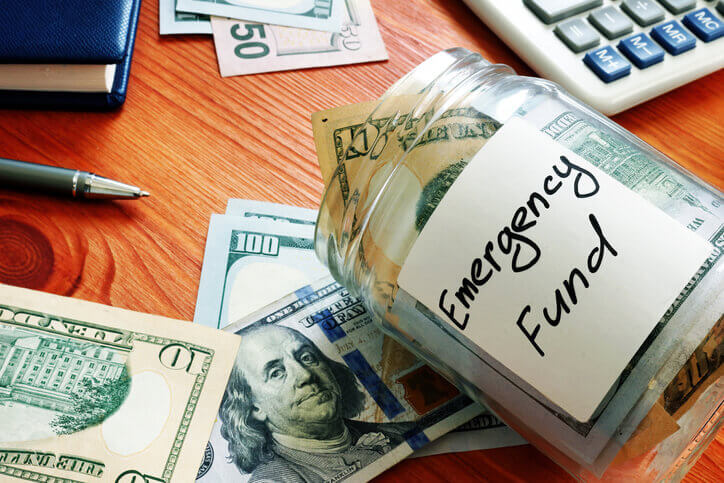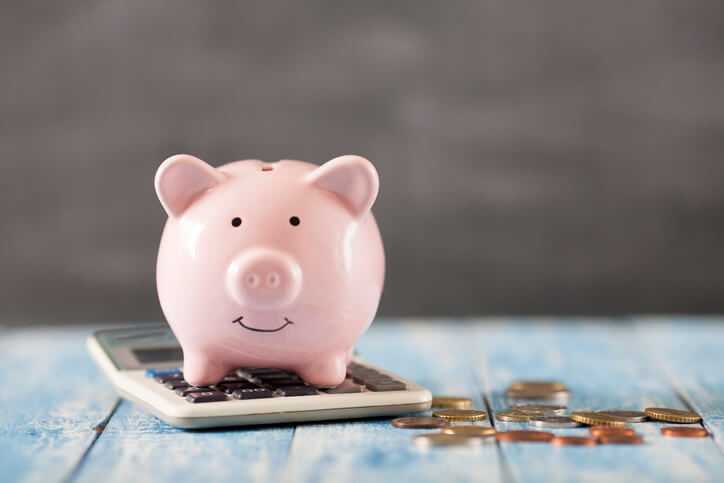A Financial Checklist Before Moving Out On Your Own
Whether you’re starting college, getting married, taking an exciting job offer, or simply seizing your independence, moving out of your parents’ house and getting your own place is an exciting time!

But you may feel some stress and anxiety mixed with that excitement. This is normal, since moving out is a big change that carries emotional weight and brings significant new responsibilities! Because many of those responsibilities will involve money, you can address your fear with proactive steps that will help you feel more prepared.
Creating a financially secure future requires a few things, including:
- Setting a budget that allows you to manage your money effectively
- Organizing your financial life and ensuring you have important documents
- Saving money for unexpected expenses
- Building good credit
- Having multiple payment options at your disposal, including at least one credit card
Let’s dive into each of these.
A Budget
Living on your own is fun and freeing, but it can be expensive. A budget can help you navigate your living expenses, monitor your spending, and cut costs where possible. The quick start method makes it simple to begin budgeting!
The Quick Start Method
- Choose a budgeting tool, such as a traditional spreadsheet, a computer program, or a personal finance app.
- Add up your income and your expenses. Subtract your total expenses from your total income to get a better idea of your cash flow and what you can reasonably save.
- Use your budgeting tool to track your spending and saving over time.
For more information, check out our guide to quick start budgeting.
Critical Financial Documents
From monthly credit card statements to yearly W2s and regular pay stubs to annual retirement account reports, our financial lives involve a lot of paperwork! If you find yourself in a situation (e.g. a car accident, a health or vet emergency, a sudden need to travel) where you need to access a document quickly, not having it can make a stressful situation much worse. This is particularly true when it comes to identifying documents, tax forms, and paperwork related to your health insurance, pets, car, and/or housing.
Identifying Documents
Identifying documents are critical if you want to start a new job, board a plane, travel internationally, and vote in elections, among other things. Examples of identifying documents include your driver’s license, Social Security card, birth certificate, and passport. Take them with you when you move and store them somewhere secure but easily accessible, such as a locked drawer, file cabinet, or safe.1
Tax Forms
Having the proper documents makes things much simpler when tax season rolls around each year. If you move at the beginning of the year and haven’t filed your taxes yet, take any relevant W2s (if you work for another company) and/or Form 1099s (if you’re self-employed) so you have them when it’s time to file. If tax season has already passed by the time you move, update your forwarding address ASAP so next year’s forms go to your current address rather than your past one.
You should also gather any supporting evidence for tax credits and deductions you plan to claim. Visit our guide to tax season for examples of tax credits and deductions you could be eligible for, as well as what you’ll need to verify your eligibility.
Other Documents
Anything related to your health insurance, your car, and/or your housing should come with you when you move. This includes:
- Your health insurance card
- Your medical records
- Vet records for any pet(s) you’re bringing with you
- Proof of car registration and insurance
- Your car’s title
- A copy of your new lease2
An Emergency Fund
Life can be unpredictable, but one thing is guaranteed: at some point, a financial shock (e.g. an expensive car repair, a doctor visit, a vet bill) will take you by surprise. This is where your emergency fund comes in!
As the name suggests, an emergency fund is specifically for addressing financial emergencies (an “emergency” in this case meaning an event that poses a threat to your immediate or future physical, financial, and/or mental health.)3 It also provides a cushion to fall back on if you lose some or all of your income during a recession or other economic difficulties.

The ideal amount for your emergency fund depends on several factors, including whether you have any debts to repay and how much your estimated monthly expenses are. If you have little to no debt, saving between three and six months’ worth of living expenses is ideal, but if that number seems overwhelming or if you’re currently paying off debt, start small with a goal of $500 or $1,000 instead.4
Not sure where you can cut costs to build your savings? Check out our 20 hacks for trimming your spending!
A Plan for Building Credit
Particularly when you’re just starting out on your own, your credit score can make a huge difference in your financial life. Your placement on the typical credit spectrum from 300 (the lowest possible score) to 850 (the closest to a “perfect” score you can get) influences what credit products you can get approved for, the borrowing terms you’re granted, and even where you can live and what conditions you’re given when renting a place. The higher your credit score, the easier it’ll be to get approved for credit, receive favorable borrowing terms, and have your choice of apartments, mortgages, credit offers, and more.
But building good credit doesn’t happen overnight, and there’s no “beginning” score you start out with. Instead, your score develops according to how you use credit once you’ve opened at least one account.5
A little bit of planning will go a long way in building a score that gives you access to the things you need and want! Your plan for building credit should address the major factors that influence your score, including:
- Payment history. Your payment history accounts for 35% of your overall credit score, making it the biggest factor in determining your score.6 A strong payment history depends on two things: making your payments on time and never skipping payments. Late or missed payments appear on your credit report and can significantly drop your credit score, accrue extra fees, and prevent you from being approved for new credit in the future, so always make your payments in full and on time.
- Credit utilization ratio. The term “credit utilization ratio” refers to your credit card balance relative to your overall credit limit. It’s the second-biggest contributor to your credit score, accounting for 30% of it. For the best chance at a high credit score, aim for a credit utilization ratio of 30% (i.e. $300 used for every $1,000 of your credit line) or below.
- Age of credit. Lenders like to see an established history of responsible credit use, so the age of your credit (i.e. the amount of time you’ve been a credit user) counts for about 15% of your credit score. There are no real shortcuts you can take here, but if you prove to be a reliable, low-risk borrower over time by making your payments by their due dates, never skipping payments, and only taking on debt you can reasonably repay, your score will steadily increase.
- Credit mix. Your “credit mix,” or the different types of credit (e.g. credit cards, personal loans, auto loans, student loans) you have, is worth about 10% of your credit score. Having multiple accounts open - even if you’re not using them - shows that you’ve been approved by more lenders, which encourages other lenders to take a chance on you as well. This is another factor you’ll need to work up to, as it takes time and diligence to prove yourself to enough lenders and get approved for enough credit products.
- Credit inquiries. Applications for new credit products, such as credit cards or personal loans, appear on your credit report and remain there for about two years. Additionally, a new inquiry temporarily drops your score (generally by about five points.) Lenders may be cautious to approve your application if your report shows multiple inquiries submitted in a short span of time, so spread out your applications for new credit.
Our Credit Health monitoring tool puts all the knowledge you need to understand and grow your credit score right in the palm of your hand. Sign up today for personalized tips, weekly updates, and more!
At Least One Credit Card
While cash and debit cards are great and have an important place in your financial life, they don’t show up in your credit report and won’t improve your score. Credit cards, on the other hand, are key to building a solid credit history and developing a great credit score.
Many financial institutions offer credit cards for first-timers that are easy to get, offer fee-free transacting, and report your payments to the credit bureaus. Sign up for at least one and use it a few times a month to begin building a steady credit history.
Get Started With Upgrade Card
Worried about the pitfalls of credit, like getting trapped in a cycle of debt? Our innovative Upgrade Card combines the flexibility of a credit card with the predictability of a personal loan. Use it anywhere traditional Visa cards are accepted, then pay your purchases off in steady installments.
Apply now and see if you’re approved! Our soft credit checks ensure your credit won’t be affected until/unless you’re approved for and accept an offer.

We’re Here for You
Your needs may change as your credit history grows and evolves, and we’d be happy to serve you in any aspect of your financial life! We partner with Cross River Bank to offer products and services that fit all needs, including:
- Cards and credit lines
- Checking accounts with rewards
- Personal loans for debt consolidation, credit card refinancing, home improvement projects, and more
Congratulations on making this big step in your life, and good luck!
- 10 Things You Should Always Keep In A Fireproof File Cabinet or Safe, Apartment Therapy
- Important Documents You Need for Moving, Updater
- An Essential Guide to Building An Emergency Fund, Consumer Financial Protection Bureau
- Emergency Fund Calculator: How Much Will Protect You?, NerdWallet
- What Credit Score Do You Start With?, Bankrate
- Focus On Credit History - It's the Most Important Credit Factor, Forbes


